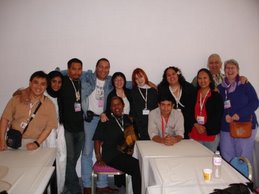by Marty Logan
GENEVA, Dec 12 (IPS) - In one part of the northern Philippines, the naming of a child begins with a history ”lesson”.
Two weeks after he or she is born, village elders gather to select a name, a process that includes narrating the history of each family member, explains Minnie Degawan of the Cordillera Peoples Alliance.
Sharing that knowledge is a way to place the burden of responsibility for raising the child -- according to the qualities of his or her namesake -- on both the child's parents and the entire village.
”This is one example of how our community can speak knowledge,” says Degawan. And it is knowledge with responsibility, she asserts, much different from the information that today's ”wired” citizens can passively take from the Internet and other information and communications technologies (ICTs).
Today, that culture of knowledge and responsibility is threatened by attempts to commodify symbols and other traditional knowledge (TK), Degawan and other speakers told the Global Forum on Indigenous Peoples and the Information Society at the World Summit on the Information Society, which closed Friday in Geneva.
And the global copyright system designed to protect intellectual property does not help indigenous peoples, they added.
Much of Inuit culture was historically protected by customary law, said Violet Ford, a vice president of the Inuit Circumpolar Conference, which represents 155,000 Inuit people in Canada, Alaska, Greenland and Russia.
”Now it is in the 'public domain',” and governments say it does not require protection, she added.
Symbols such as the Inuit kayak, amauti (traditional women's coat) and Inukshuk (a pile of rocks used as a navigation marker) have been copied and used to sell myriad products. The Inukshuk, for example, now adorns the box of a product used to combat erectile dysfunction, said Ford.
But while the copyright system does not accept the concept of a group registering its traditional knowledge, more than 100 individuals and companies in Canada alone have applied for a copyright on the Inukshuk, she added.
”Without protection, Inuit culture will continue to be sought after as a commodityàdevalued and minimised.”
Indigenous peoples have long called for nations to establish 'sui generis', new and unique national systems to protect their traditional knowledge, but have made little headway.
The bodies that regulate copyright, including the World Intellectual Property Organisation (WIPO), are suggesting other solutions, including that indigenous peoples enter into contracts with those who wish to use their cultural symbols and other knowledge..
Violet Ford says that path is full of obstacles, particularly because many indigenous groups do not have much experience in contract law and would be at a disadvantage in negotiations.
”The current position of the Inuit is to work globally (to reform the copyright system) via WIPO,” she added.
A WIPO official says some indigenous groups have successfully completed contracts that protect their traditional knowledge.
”The point is to work out what elements of your culture are likely to be misused,” says Tony Taubman, head of WIPO's traditional knowledge division.
”Often it's the well-meaning academic researcher (who misuses TK). They see this as information in the public domain and want to report on it as an academic (exercise),” he added in an interview.
Taubman says he recognises that indigenous peoples are debating whether they should work within the existing system of copyright protection or insist on creating something unique, and that WIPO must do more to reach out to them to try and resolve the issue, as long as they are willing to cooperate.
Degawan is sure that she does not want to adhere to that system. For one, it would ”crystallise” her culture.
”Knowledge is not something that you own but is something that is developed over the ages, through practiceàyou have to share it because if you don't share it, it becomes static.”
”We need to inform the WIPO that what they have may be appropriate for them à but it is not appropriate for my culture,” Degawan added. (END/2003)
*Article source: http://ipsnews.net/interna.asp?idnews=21517
Tuesday, December 12, 2006
Subscribe to:
Comments (Atom)


